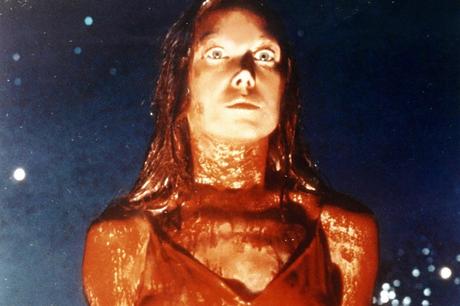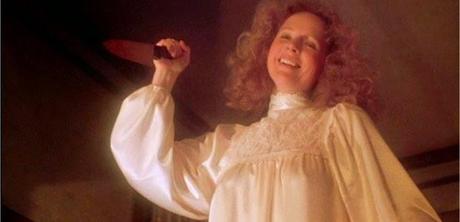 Brian De Palma scored his breakthrough with Carrie (1976), a flashy adaptation of Stephen King's novel. This supernatural study of adolescent angst makes a compelling horror show, even with De Palma's habitual excess.
Brian De Palma scored his breakthrough with Carrie (1976), a flashy adaptation of Stephen King's novel. This supernatural study of adolescent angst makes a compelling horror show, even with De Palma's habitual excess. Outcast teen Carrie White (Sissy Spacek) suffers bullying from classmates and her mother's (Piper Laurie) religious fanaticism. But Carrie suffers from a less common affliction: she possesses telekinetic powers, which manifest themselves at inopportune times. Classmate Sue (Amy Irving) feels guilty for teasing Carrie and convinces her boyfriend (William Katt) to invite Carrie to the prom. Carrie finally stands up to her mom and brush off the bullies. But her nemesis Chris (Nancy Allen) plans a nasty prom, resulting in catastrophic consequences.
Carrie is really a teen drama in a slasher movie's skin. Carrie discovers her powers during her first period, making telekinesis a parable for puberty. Carrie's emotionally abused: students shower her with tampons, an English teacher (Sydney Lassick) mocks her and the Principal (Stefan Gierasch) can't even remember her name. Mom locks Carrie in a prayer closet, equating her period with sin and accusing Carrie of being a witch. Kindness by Miss Collins (Betty Buckley) and Sue only makes things worse, with queen bee Chris ruthlessly restoring the teen pecking order.
De Palma and writer Lawrence D. Cohen mix their coming-of-age story with payback catharsis. Every scenario's played at fever pitch, from the inhuman bullies to Piper Laurie's mad dog mama. Kindness is offset by cruel irony: Miss Collins is so convinced Sue's plotting something that she misses Chris's scheming. Carrie's slow maturation rouses our sympathy, and her humiliation is heartbreaking - at least, until she slaughters dozens of classmates. Many teens are trapped in situations where they can't hit back. Carrie provides a satisfying revenge fantasy.

This high-toned excess matches De Palma perfectly. Besides obligatory Hitchcock homages (the Psycho musical stings, Rebecca's burning house), De Palma presents excellent set pieces. The prom sequence is excruciatingly tense, De Palma voiding all sound except for a clanking bucket. And Carrie's psychic rampage is well worth the build-up. Just as often though, De Palma's overwrought and tasteless, from the soft-core shower scene to a character quivering sexually as knives impale them. Most regrettably, Carrie closes with a gratuitous "gotcha!" scare that ruins a poignant ending.
Sissy Spacek does great work with a near-impossible role. She sensitively navigates Carrie's development from meek innocent to assertive teen, then shifts into bewildered rage. Spacek never loses our sympathy even when becoming a mass murderer. Amy Irving and William Katt play sympathetic foils. Nancy Allen is credibly nasty, but John Travolta is singularly bland. Piper Laurie's scenery chewing is too broad to buy, though her murderous breakdown is suitably chilling.
Coming a year after Jaws, Carrie helped codify modern horror tropes. If its tone and staging seem hysterical, it suits the material. How could a supernatural puberty parable be subtle? From its game cast to the iconic set pieces, Carrie is a winner.

